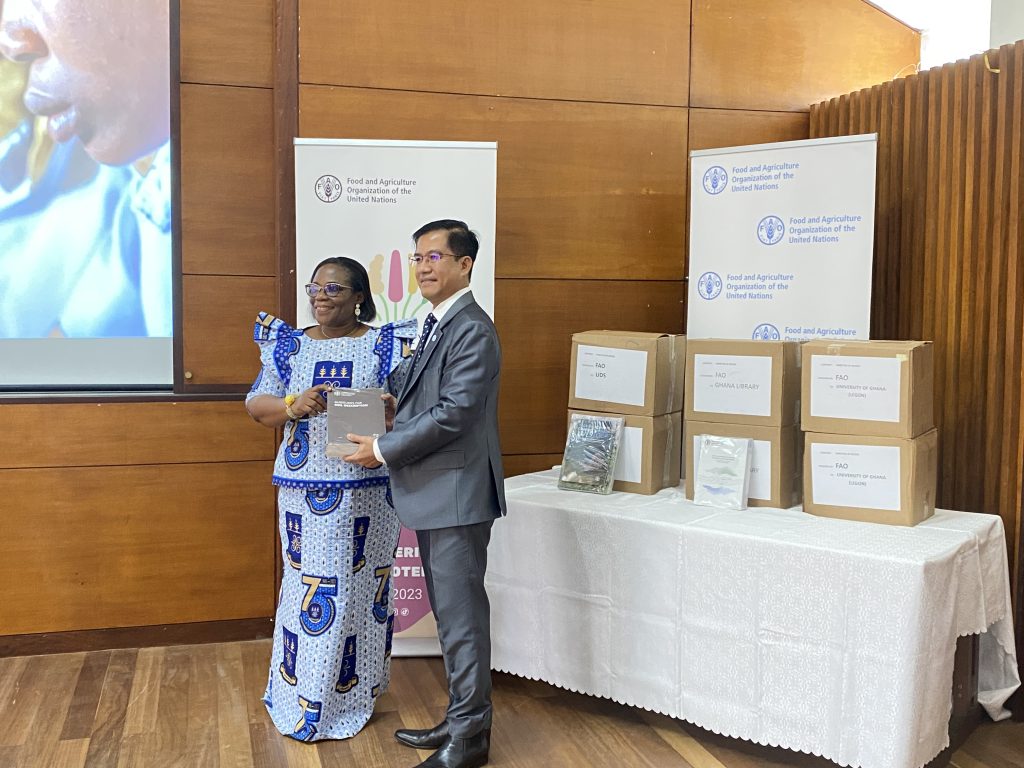By Edward Dankwah
Accra, Aug. 15, GNA – The Food and Agriculture Organisation (FAO) has handed over more than 8,000 publications to the School of Agriculture at the University of Ghana (UG), University for Development Studies (UDS) and the Ghana Library Authority (GhLA).
The exercise, which would contribute to the advancement of knowledge, served as a testament to FAO’s commitment to fostering learning, knowledge sharing, and collaboration across the African continent.
The publications spanned a wide spectrum of topics including agriculture, biodiversity, African agricultural statistics, food processing, forests and forestry, gender in agriculture, climate change and climate smart agriculture, agripreneurship, animal health, rural youth issues and nutrition.
Mr Yasmi Yurdi, the FAO Country Representative, said within the pages laid the potential to empower students and researchers to ignite innovation and progress and strengthen partnerships.
“The wealth of knowledge contained within these publications would serve as a guiding light, illuminating pathways to a sustainable future for both present and future generations,” he added.
The FAO representative said recently, their assistance had focused on sustainable improvements in agricultural production, sustainable management of the environment and natural resources, and building resilient communities for reducing rural poverty.
“Our flagship publications, including the State of Food Security and Nutrition in the World, the State of the World’s Forests, the State of World Fisheries and Aquaculture, and the State of Agricultural Commodity Markets, are freely available to you on our website,” he said.
Mr Yurdi said knowledge sharing was a beacon that provided guidance towards the achievement of the Sustainable Development Goals.
“Data and analytics gleaned from these publications will fuel our journey towards a more equitable, sustainable, and prosperous world, and in this journey, we must acknowledge the monumental potential of Africa’s youth,” he said.

Mr Michael Ansa, the Senior Assistant Registrar, UDS, said for people to excel in life at the personal and higher levels, they must continue to acquire the necessary knowledge, skills, and competencies to contribute meaningfully to nation building and the progress of humankind.
Mr Ansa said the publications from FAO contained varied real-life experiences and best practices across the globe that would further empower students to become game changers wherever they found themselves.
“And it is for this and many other reasons that UDS is excited to partner with FAO in knowledge sharing,” he added.
Mr Ansa assured FAO that the books received would be put to good use to bring about the desired impart, recognising that in this global world, driven by technology and digitisation, no organisation could survive and grow without collaborating with others.
“We will also appreciate exchange visit programmes for our students and lecturers as a real eye-opener for them to enhance teaching, learning, research and outreach activities of the University,” he said.
Dr Irene Susana Egyir, the Dean, School of Agriculture, UG, said most of the things discovered in academia were found in books, and that findings also discovered on the fields were documented.
She said the publications received contained a wider range of information that would benefit the student and the faculty at large.
Mr Edward Addo-Yobo, the Representative of the Deputy Director, GhLA, said reading was the process of looking at a series of written symbols and getting meaning from them, and that the publications received would be utilised effectively in that regard.
He commended the FAO for supporting the School of Agriculture at the UG, the UDS and the GhLA with the learning resources.
GNA